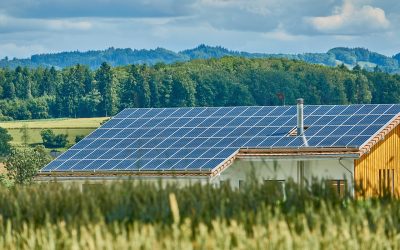So, you’ve probably heard the buzz about the solar industry job growth, right? It’s been quite the hot topic lately, and for good reason. The solar industry has been experiencing remarkable growth, creating countless employment opportunities for folks all across the board. Experts are predicting that this trend is only going to continue, with solar energy becoming an integral part of our future. And trust me, you don’t want to miss out on the exciting prospects this booming industry has to offer. Whether you’re an environmentalist at heart or simply looking for a promising career path, the solar industry might just be the golden ticket you’ve been waiting for.
Overview of the Solar Industry
1.1 History of the Solar Industry
The history of the solar industry dates back to the 19th century when French physicist Edmond Becquerel observed the photovoltaic effect. However, it was not until the mid-20th century that solar energy became a viable source of power. The development of efficient solar panels and the increasing concerns about fossil fuel emissions have fueled the growth of the solar industry over the years.
1.2 Current State of the Solar Industry
Today, the solar industry is experiencing rapid growth and is considered one of the fastest-growing sectors in the world. The increasing demand for clean and renewable energy sources, along with advancements in solar technology, has led to a significant increase in the adoption of solar power systems. Solar energy is being used for both residential and commercial purposes, making it an attractive investment for individuals and businesses alike.
1.3 Factors Driving the Growth of Solar Industry
Several factors contribute to the growth of the solar industry. The most significant factor is the increased awareness and concern about the environmental impact of traditional energy sources. Solar energy is clean and does not produce harmful greenhouse gas emissions, making it an attractive alternative to fossil fuels. Additionally, the decreasing costs of solar panels and the availability of government incentives and tax credits have also played a crucial role in driving the growth of the solar industry.
Types of Solar Jobs
2.1 Solar Installation Jobs
Solar installation jobs involve the installation of solar panels and other components of solar power systems. These jobs require technical skills and knowledge of electrical systems. Solar installers work closely with engineers and designers to ensure the proper installation and integration of solar systems into buildings. This type of job offers hands-on experience and the opportunity to contribute to the transition to renewable energy.
2.2 Solar Manufacturing Jobs
Solar manufacturing jobs involve the production of solar panels, inverters, and other solar equipment. These jobs are crucial for meeting the increasing demand for solar products. Solar manufacturing requires expertise in engineering, research and development, and manufacturing processes. These jobs offer the chance to work in state-of-the-art facilities, contribute to technological advancements, and be a part of the production of clean energy solutions.
2.3 Solar Sales and Marketing Jobs
Solar sales and marketing jobs focus on promoting and selling solar products and services. These jobs require a strong understanding of solar technology and the ability to effectively communicate the benefits of solar energy to potential customers. Sales and marketing professionals in the solar industry work closely with customers to assess their energy needs and develop customized solar solutions. This type of job offers the opportunity to make a positive impact on the environment while helping customers save money on their energy bills.
2.4 Solar Engineering and Design Jobs
Solar engineering and design jobs involve the planning and design of solar power systems. These jobs require expertise in electrical engineering, project management, and computer-aided design (CAD) software. Solar engineers and designers work on projects ranging from residential installations to large-scale solar farms. They are responsible for optimizing the performance and efficiency of solar systems, ensuring compliance with building codes and regulations, and integrating solar energy into existing infrastructures.
Job Opportunities in the Solar Industry
3.1 Local and State Government Jobs
Local and state governments play a crucial role in supporting the growth of the solar industry. They often employ professionals to oversee renewable energy initiatives, manage solar incentive programs, and develop policies to promote the use of solar energy. Job opportunities in local and state governments can include positions in energy departments, sustainability offices, and economic development agencies.
3.2 Utility Companies and Power Plants
Utility companies and power plants are increasingly incorporating solar energy into their portfolios. As a result, they require professionals with expertise in solar power systems to design, implement, and maintain solar projects. Job opportunities in utility companies and power plants can range from project managers and engineers to technicians and maintenance personnel.
3.3 Solar Panel Manufacturers
Solar panel manufacturers are at the forefront of the solar industry. They require a range of professionals, including engineers, technicians, and production line workers, to manufacture high-quality solar panels. Job opportunities in solar panel manufacturing can involve research and development, quality control, production planning, and logistics.
3.4 Solar Installation and Maintenance Companies
Solar installation and maintenance companies are essential for the successful implementation and maintenance of solar power systems. These companies require skilled professionals with experience in solar installation, electrical work, and system troubleshooting. Job opportunities in solar installation and maintenance companies can include solar installers, electricians, system designers, and technical support staff.
Skills and Qualifications Required
4.1 Technical Skills
Working in the solar industry requires a strong foundation of technical skills. These skills include knowledge of electrical systems, solar energy principles, and the ability to read and interpret technical specifications. Technical skills are particularly essential for solar installation, manufacturing, and engineering jobs. It is important to stay updated with the latest advancements in solar technology to remain competitive in the industry.
4.2 Knowledge of Photovoltaic Systems
A thorough understanding of photovoltaic (PV) systems is necessary for professionals in the solar industry. PV systems convert sunlight into electricity, and knowledge of how they work is critical for designing, installing, and maintaining solar power systems. Familiarity with PV system components, such as solar panels, inverters, and racking systems, is essential for various job roles in the industry.
4.3 Project Management Skills
Project management skills are valuable in the solar industry, especially for roles involving solar power system design and implementation. Professionals with project management skills can effectively plan, organize, and execute solar projects, ensuring their successful completion within budget and deadline constraints. These skills are particularly important for larger projects, such as utility-scale solar installations or solar farm developments.
4.4 Sales and Marketing Skills
For professionals in solar sales and marketing roles, strong sales and marketing skills are crucial. These skills involve the ability to identify potential customers, build relationships, and effectively communicate the benefits of solar energy. Sales and marketing professionals in the solar industry must be able to understand customer needs and tailor solar solutions to meet those needs. Additionally, staying updated with the latest sales and marketing strategies can help professionals excel in their roles.
Training and Education for Solar Jobs
5.1 Certification Programs
Certification programs are valuable for individuals looking to establish themselves in the solar industry. Various organizations, such as the North American Board of Certified Energy Practitioners (NABCEP), offer certifications that validate technical skills and knowledge in solar power systems. These certifications can enhance job prospects and provide individuals with a competitive edge in the industry.
5.2 Vocational and Trade Schools
Vocational and trade schools offer specialized training programs in solar installation, engineering, and design. These programs provide hands-on training, allowing individuals to gain practical skills and experience in the solar industry. Vocational and trade schools often collaborate with industry partners, ensuring that the curriculum reflects the current needs and trends of the solar industry.
5.3 College Programs and Degrees
Many colleges and universities offer programs and degrees related to renewable energy and solar technology. These programs provide a comprehensive education in solar energy, including technical, engineering, and business aspects. Graduates from college programs and degrees can pursue various career paths in the solar industry, ranging from solar design and engineering to research and development.
Benefits of Working in the Solar Industry
6.1 Job Growth and Stability
The solar industry offers significant job growth and stability compared to many other industries. With the increasing adoption of solar power systems, the demand for skilled professionals in the industry continues to rise. Job opportunities in the solar industry are projected to grow at a faster rate than the national average, providing long-term employment prospects.
6.2 Competitive Salaries
Professionals in the solar industry can expect competitive salaries. The growing demand for solar installations and the need for experienced personnel have contributed to higher wages for skilled workers. Additionally, specialized roles such as solar engineers and project managers often command higher salaries due to the technical expertise and responsibilities involved.
6.3 Positive Environmental Impact
Working in the solar industry allows individuals to make a positive impact on the environment. By promoting and installing solar power systems, professionals in the industry contribute to reducing carbon emissions and dependence on fossil fuels. The transition to clean and renewable energy sources is crucial for mitigating climate change and preserving the environment for future generations.
6.4 Advancement Opportunities
The solar industry offers ample opportunities for career advancement. Professionals can start in entry-level positions and progress to supervisory or management roles as they gain experience and develop their skills. The rapid growth of the solar industry creates a dynamic environment that fosters innovation and professional development.
Challenges in the Solar Industry
7.1 Fluctuating Market Demand
Fluctuating market demand is one of the challenges faced by the solar industry. The demand for solar installations can vary depending on factors such as government policies, economic conditions, and financial incentives. Professionals in the industry need to adapt to these fluctuations and stay updated with market trends to ensure a stable source of employment.
7.2 Competition from Fossil Fuels
The solar industry faces competition from traditional fossil fuel sources. Although solar energy is increasingly becoming cost-effective and reliable, fossil fuels still dominate the global energy market. Professionals in the solar industry need to continually advocate for renewable energy solutions and educate consumers about the benefits of solar power to overcome this challenge.
7.3 Policy and Regulatory Changes
Changes in government policies and regulations can impact the solar industry. The availability of incentives and subsidies, net metering policies, and utility regulations can influence the demand for solar installations and the financial viability of solar projects. Professionals in the industry need to stay informed about these changes and adapt their strategies and approaches accordingly.
Future Outlook of Solar Job Market
8.1 Projected Job Growth
The future outlook of the solar job market is highly promising. The International Renewable Energy Agency (IRENA) projects that the solar industry will continue to experience significant job growth in the coming years. As the cost of solar technology continues to decline and the push for renewable energy intensifies, the demand for skilled workers in the solar industry will continue to rise.
8.2 Technological Advancements
Technological advancements in solar technology will drive the future development of the industry. Innovations in solar panel efficiency, energy storage systems, and smart grid technologies will further increase the adoption of solar power systems. Professionals in the solar industry need to stay updated with these advancements to remain competitive and take advantage of emerging job opportunities.
8.3 Government Initiatives and Incentives
Government initiatives and incentives will play a crucial role in shaping the future of the solar job market. The implementation of favorable policies, such as renewable portfolio standards and feed-in tariffs, can drive the demand for solar installations and create a favorable environment for job growth. Professionals in the solar industry need to stay engaged with policy developments and advocate for supportive measures to ensure the continued growth of the industry.
Conclusion
9.1 Recap of Solar Industry Job Growth
The solar industry has experienced significant growth in recent years and is poised for continued expansion. With increasing concerns about climate change and the push for renewable energy, the demand for solar power systems has skyrocketed. This growth has created numerous job opportunities across various sectors of the solar industry, including installation, manufacturing, sales, and engineering.
9.2 Importance of Investing in Renewable Energy Workforce
Investing in the renewable energy workforce, particularly in the solar industry, is crucial for achieving a sustainable and clean energy future. By supporting education and training programs, promoting workforce development, and implementing favorable policies, governments, organizations, and individuals can contribute to the growth of the solar industry and help address pressing global environmental challenges. The solar industry offers rewarding career prospects, competitive salaries, and the opportunity to make a positive impact on the environment. By embracing the solar industry, individuals can play a significant role in shaping a cleaner and more sustainable future.










